Written by VSTE Professional Services member Allyson Hartung (@allysonehartung)
As an instructional technology coach, one of my goals is to help teachers integrate digital citizenship lessons into their everyday classroom routines. In today’s world, understanding online safety, privacy, and having responsible behavior online isn’t just helpful, it’s essential. So how do I keep digital citizenship alive all year long and not just during Digital Citizenship Week? Enter: Digital Citizenship Bins.
What Are Digital Citizenship Bins?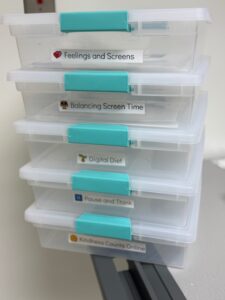
Digital Citizenship Bins are curated kits that contain all lesson materials, activities and visuals to teach students about responsible digital behavior with an added bonus of no planning or prep work for the teacher 😉. A lesson was designed to take no more than 30 minutes which makes it perfect for integrating into a social-emotional learning block. Each bin focuses on a key topic: such as digital footprint, privacy and safety, cyberbullying, or digital balance, and includes 5–6 interactive lessons tailored for grades K–2 and 3–6. These bins make digital citizenship tangible, engaging, and meaningful for students.
What’s Inside Each Bin:
- Lesson Plan: A ready-to-use, scripted lesson plan with guiding questions and discussion prompts to support
instruction. - Anchor Activities: Each bin includes a quick read-aloud paired with discussion prompts. For example, a Digital Balance Bin might feature Unplugged by Steve Antony, along with an activity sheet where students draw or write things they enjoy doing on screens on one side and off screens on the other.
- Hands-On Experiences: Students engage in interactive games, role-playing scenarios, or sorting activities that help them practice safe and responsible online behaviors.
- Visual Supports: Anchor charts, posters, or an illustrated guide to reinforce key concepts, helping students remember what it means to be safe, respectful, and responsible online.
Why I Love Using Digital Citizenship Bins:
- Student Engagement: The hands-on, interactive elements make learning about online safety fun and relatable. Students don’t just learn about it, they can experience it.
- Teacher Support: The boxes come with ready-to-use resources, lesson plans, and materials, making it quick and easy for educators to implement.
- Standards Alignment: All lessons align with ISTE Standards for Students, ensuring digital citizenship instruction meets key educational benchmarks.
Tips for Implementing Digital Citizenship Bins:
- Focus on one topic at a time for better understanding.
- Pair lessons with read-alouds to anchor concepts in relatable stories that can resonate with students.
- Encourage reflection by giving students opportunities to share their thoughts and experiences.
- Rotate the bins throughout the year to reinforce the importance of digital citizenship over time.
Digital Citizenship Bins are more than just kits, they serve as a bridge between technology and meaningful, responsible student use. As we continue to help students navigate the digital world safely and ethically, these bins make teaching digital citizenship lessons easy, engaging, and enjoyable.
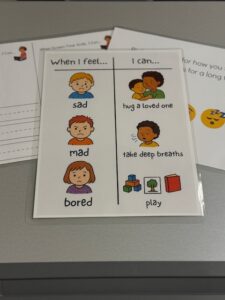
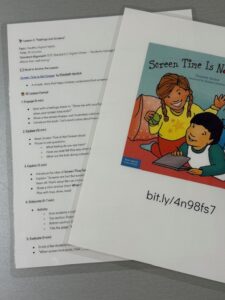

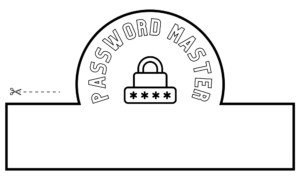

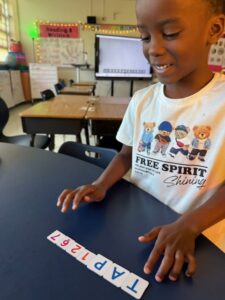


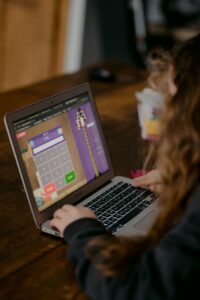
 Allow students to work through this
Allow students to work through this  Common Sense Media has
Common Sense Media has  Referring to digital citizenship as ‘digital and literacy skills,’
Referring to digital citizenship as ‘digital and literacy skills,’  Timely and likely more useful for high school students, the Newseum has an
Timely and likely more useful for high school students, the Newseum has an  Cyberbullying is an important component of digital citizenship and absolutely necessary given our virtual learning situations.
Cyberbullying is an important component of digital citizenship and absolutely necessary given our virtual learning situations. 

